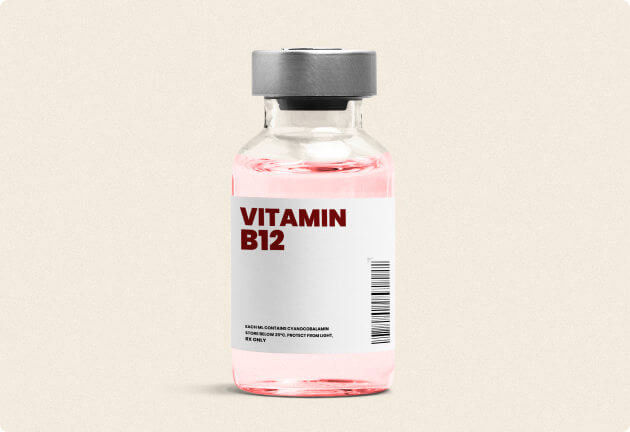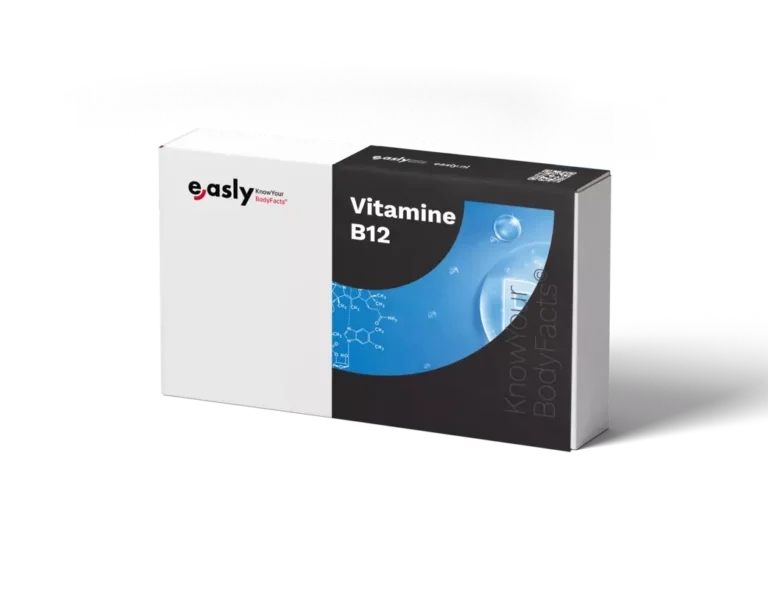Vitamins play an essential role in our body, including vitamin B12. Vitamin B12 is needed for the production of red blood cells and the proper functioning of the nervous system. Because your body is not able to produce vitamin B12 on its own, it must be obtained from foods or supplements. A vitamin B12 deficiency is common, especially in older adults and people following a vegetarian or vegan diet. It is possible that a vitamin B12 deficiency is even more common, because the symptoms are not always reported, which means they are not diagnosed. In this blog, we discuss the function of vitamin B12, what the symptoms and causes of a deficiency are, and how to treat and prevent a deficiency in the future.


Function of vitamin B12
There are so many different vitamins, but what does vitamin B12 do and where is vitamin B12 found? Vitamin B12, also known as cobalamin, plays an important role in the body.
- It is necessary for the production of red blood cells and the maintenance of a healthy nervous system.
- Vitamin B12 is also involved in the conversion of homocysteine, a substance that can be harmful to blood vessels, into methionine, an amino acid that is necessary for the building of proteins.
- In addition, vitamin B12 is important for the metabolism of folic acid (vitamin B11). It ensures that folic acid can function properly in the body.

Vitamin B12 is mainly found in animal products, such as meat, fish, poultry, eggs, and dairy products. Therefore, vegetarians and vegans are at a greater risk of a vitamin B12 deficiency. Some breakfast cereals and soy products are fortified with vitamin B12. However, the body has difficulty absorbing vitamin B12 from plant sources. Therefore, it is extra important for vegetarians and vegans to keep an eye on their vitamin B12 blood levels. With Easly, you can easily find out if your vitamin B12 levels are sufficient with a vitamin B12 deficiency test.
Causes and symptoms of a vitamin B12 deficiency
A vitamin B12 deficiency can occur in several ways. There may be an absorption problem, where the intestines cannot absorb vitamin B12 well. This is the case, for example, with gastrointestinal diseases such as coeliac disease or Crohn’s disease. An absorption problem can also occur after someone has had bowel surgery.
In addition, there may also be insufficient intake of vitamin B12. As mentioned earlier, the body cannot produce vitamin B12 itself and we have to get it from our diet. If someone receives too little vitamin B12 for a long time, this can lead to a deficiency. Vegetarians and vegans in particular are at risk of this; it is important for them to regularly undergo a blood test for vitamins. Finally, certain medications can cause the absorption of vitamin B12 to be less effective, such as acid reducers, metformin (medication for diabetes mellitus), and long-term use of certain antibiotics.
So a vitamin B12 deficiency can be the cause of many chronic complaints. A deficiency can cause the following symptoms:
- Fatigue and/or weakness
- Shortness of breath
- Heart palpitations
- Dizziness and/or fainting
- Sweating
- Headache
- Ringing in the ears/tinnitus
- Tingling in hands and feet
- Reduced feeling in hands and feet
- Balance problems
- Dropping things from hands easily.




Treatment for vitamin B12 deficiency
A vitamin B12 deficiency can lead to anemia, nerve damage, and other health problems. If there is a deficiency, you want to supplement this vitamin B12 deficiency. Fortunately, a vitamin B12 deficiency is easily treatable. The treatment consists of taking vitamin B12 supplements, usually in the form of tablets or injections. It is important to determine the cause of the deficiency and treat it if necessary. For example, by looking at dietary intake, absorption problems, medication use, and possibly other underlying diseases.



If you think you have a vitamin B12 deficiency, it is important to have a blood test to measure the vitamin B12 level in your blood and to get advice on the appropriate treatment. It is also important to ensure a varied diet to get enough vitamin B12 and to prevent the above-mentioned health problems.
Related tests



Prevention tips to avoid a vitamin B12 deficiency
To prevent a vitamin B12 deficiency, it is important to consume enough vitamin B12 from food. Vitamin B12 is mainly found in animal products such as meat, fish, eggs, milk, and dairy products.
People who consume few or no animal products, such as vegans and vegetarians, are at a greater risk of a B12 deficiency and are advised to use supplements to ensure an adequate intake of vitamin B12. Older individuals also have an increased risk of a vitamin B12 deficiency because the absorption of vitamin B12 from food decreases with age.


Conclusion
Vitamin B12 is an important nutrient necessary for the production of red blood cells, the proper functioning of the nervous system, and certain metabolic processes. A deficiency in vitamin B12 can lead to anemia and neurological problems. Therefore, it is important to consume enough vitamin B12 from food and to treat a deficiency promptly with vitamin B12 injections or supplements. People who consume few or no animal products are at a greater risk of a B12 deficiency and are advised to use supplements to ensure an adequate intake of vitamin B12.


Are you experiencing symptoms that may indicate a deficiency? Or do you follow a vegetarian or vegan diet? If so, we recommend regularly checking your vitamin B12 levels in your blood. At Easly, this can be done reliably and easily with the vitamin B12 test.
Sources:
- National Institutes of Health – Vitamin B12
- NHG – Diagnostiek van vitamine B12-deficiëntie
- Voedingscentrum – Vitamine B12 (cobalamine)








